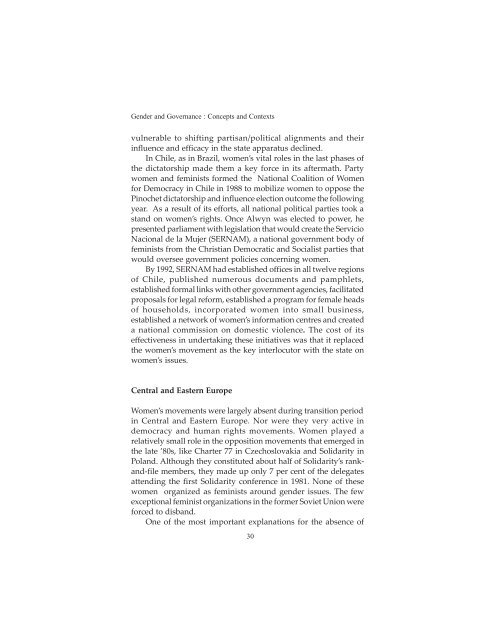Essays On Gender And Governance - United Nations Development ...
Essays On Gender And Governance - United Nations Development ...
Essays On Gender And Governance - United Nations Development ...
You also want an ePaper? Increase the reach of your titles
YUMPU automatically turns print PDFs into web optimized ePapers that Google loves.
<strong>Gender</strong> and <strong>Governance</strong> : Concepts and Contexts<br />
vulnerable to shifting partisan/political alignments and their<br />
influence and efficacy in the state apparatus declined.<br />
In Chile, as in Brazil, women’s vital roles in the last phases of<br />
the dictatorship made them a key force in its aftermath. Party<br />
women and feminists formed the National Coalition of Women<br />
for Democracy in Chile in 1988 to mobilize women to oppose the<br />
Pinochet dictatorship and influence election outcome the following<br />
year. As a result of its efforts, all national political parties took a<br />
stand on women’s rights. <strong>On</strong>ce Alwyn was elected to power, he<br />
presented parliament with legislation that would create the Servicio<br />
Nacional de la Mujer (SERNAM), a national government body of<br />
feminists from the Christian Democratic and Socialist parties that<br />
would oversee government policies concerning women.<br />
By 1992, SERNAM had established offices in all twelve regions<br />
of Chile, published numerous documents and pamphlets,<br />
established formal links with other government agencies, facilitated<br />
proposals for legal reform, established a program for female heads<br />
of households, incorporated women into small business,<br />
established a network of women’s information centres and created<br />
a national commission on domestic violence. The cost of its<br />
effectiveness in undertaking these initiatives was that it replaced<br />
the women’s movement as the key interlocutor with the state on<br />
women’s issues.<br />
Central and Eastern Europe<br />
Women’s movements were largely absent during transition period<br />
in Central and Eastern Europe. Nor were they very active in<br />
democracy and human rights movements. Women played a<br />
relatively small role in the opposition movements that emerged in<br />
the late ’80s, like Charter 77 in Czechoslovakia and Solidarity in<br />
Poland. Although they constituted about half of Solidarity’s rankand-file<br />
members, they made up only 7 per cent of the delegates<br />
attending the first Solidarity conference in 1981. None of these<br />
women organized as feminists around gender issues. The few<br />
exceptional feminist organizations in the former Soviet Union were<br />
forced to disband.<br />
<strong>On</strong>e of the most important explanations for the absence of<br />
30

















